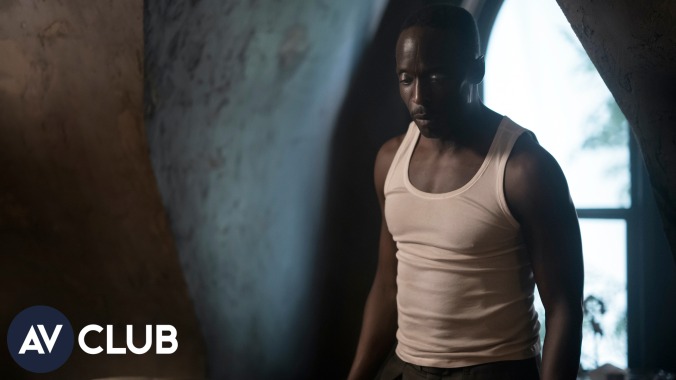Lovecraft Country’s Michael Kenneth Williams on once again playing a closeted Black man
Known best for his portrayal of Omar, a stern-faced stick-up man with a strict moral compass on The Wire, Michael Kenneth Williams has made a career out of playing hard-edged characters you can’t help but root for. On Lovecraft Country, he plays Montrose Freeman, who we first meet as he bursts through the ground after being held captive by some racist assholes. He’s there looking for answers about his late wife’s heritage, but also because he’s fiercely committed to keeping his son out of the whole thing—something that becomes abundantly clear when he almost immediately shames his son for coming to save him. In Lovecraft Country’s most recent episode, “Strange Case,” we learn more about Montrose’s long term, ongoing, and mostly secret relationship with a man, see him hanging out with drag queens played by Shangela and Monet X Change, and eventually seem to watch him find some level of acceptance among the gay community.
But does that crowd-surfing moment mark a new beginning for Montrose, or is the old, hateful, controlling and controlled character still in there? The A.V. Club sat down with Williams to find out. Portions of that chat are in the video above, with a full transcript is below.
The A.V. Club: Your character in Lovecraft Country is a closeted gay Black man. This is not the first time you had to approach that type of scenario, but maybe the first time you’ve had to consider what it would have been like in the ’50s. How did you approach what it was like to be closeted at that time? Did you talk to anyone or read any source material in preparation?
Michael Kenneth Williams: No, no, no, no. I didn’t make his sexuality the thing that I went after. It was the fact that he never had the chance to identify as anything. By the time we meet Montrose, he is so traumatized. He survived a massacre that took place in Tulsa. He moves to the South Side of Chicago, which is like moving into a war zone within itself. And he’s doing this during the Jim Crow era. That’s how we meet him. He’s been so beaten into a box and told how to feel and what the definition of Black masculinity or Black sexuality feels like. He was made to feel so much that being soft or being soft spoken or being mild… that his demeanor was a sign of weakness by his father that I don’t think he really had a chance to define himself any which way. Thank God he had a friend in his wife who accepted him in his bewilderment or in his quest to explore himself.
So that’s the aspect I played him from. What is this man like? The self-hatred that must bring, not being able to even explore what I might want to be, and being told I have to be this way. “A man has to become a father. He has a son.” Not just children: “A man has a son.” He says that, you know. So I more or less dove into that and tried to unpack that.
 Keep scrolling for more great stories.
Keep scrolling for more great stories.

